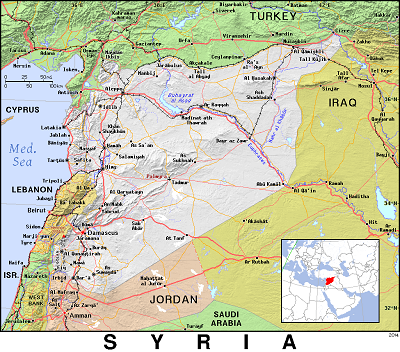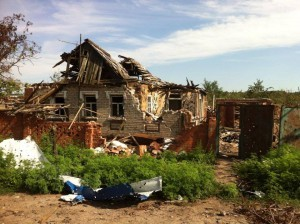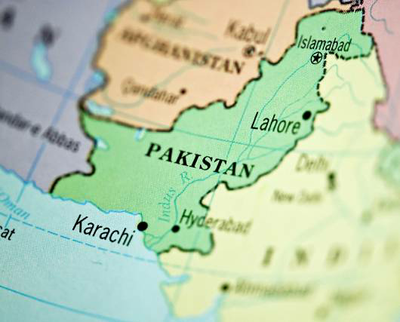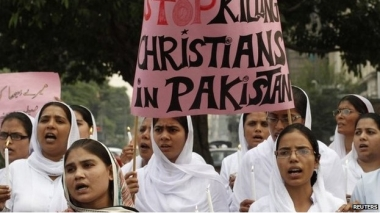2020 Pennsylvania Ave. NW #241
Washington, D.C. 20006
www.persecution.org | E-mail: [email protected]
ISIS raid sends more than 3,000 fleeing from their villages and leaves churches destroyed in latest attack.
Todd Daniels, Regional Manager for the Middle East
Washington, D.C.
International Christian Concern
Just before dawn on Monday, February 23, ISIS fighters entered the Assyrian Christian villages outside of Tal Tamr in Syria's Hasakah region. More than 90 men, women and children were taken from the villages and are believed to still be held by ISIS. As many as four churches have been destroyed and over 3,000 have fled their homes following the assault on the Christian villages along the Khabur River."We fell asleep in total quiet, nothing was going on...," a woman who had fled Tal Tamr with her four young kids said. "We woke up to the sound of clashing; we didn't know what it was, until we saw that everyone in the camp was fleeing because ISIS had entered the village."
Initial reports stated that the men were taken by the fighters to the Abd al-Aziz Mountains, while the women and children were left in the village, guarded by ISIS militants, Steve Oshana, Executive Director of A Demand for Action (ADFA), told International Christian Concern (ICC) on Monday.
Sources of the Syrian Observatory for Human Rights reported overhearing ISIS fighters say they had detained "56 crusaders" from Tal Shamiram. Additional reports of abductions pushed that number to between 70-100, according to Nuri Kino, founder of ADFA, with some reportsas high as even 200 abducted.
On Tuesday, it was being reported that the hostages had now been moved to the Al-Shadadi village, Osama Edward, Director of the Assyrian Human Rights Network, told ICC.
"Most of the hostages are women, the elderly, and children," Edward said. "In fact, mostly women as many of the young men were fighting with the militias that are trying to defend these areas," he continued.
Churches Destroyed as Thousands Flee
Residents immediately started to flee the area, hoping to make it to the Kurdish-held city of Hassakah, 40 miles away, or to Qamishli, 60 miles away, along the Turkish-Syrian border.
About 3,000 people are believed to have fled the Tal Tamr region, finding rides in private cars. Some were able to get busses to the area to drive people out of their villages.
Hundreds are taking refuge in the St. Mary Church in Hasakah and the St. Ephrem Church in Qamishli, AINA reported.
The cluster of around 35 Assyrian villages along the Khabur River had been home to between 40,000-45,000 Christians prior to 2011, Edward told ICC. Estimates were now that the remaining population was closer to 3,000 before these latest attacks forced entire villages to evacuate.
Large amounts of rain actually may have prevented the attack from being even more deadly. "In summer time you can cross the river, but the past three or four weeks have seen a lot of rain. So ISIS was able to attack the villages just on one side of the river," said Edward.
A number of churches have also been destroyed by ISIS during these raids. The church in Tel Hurmiz, one of the oldest churches in Syria, was destroyed, as well as the Assyrian Mar Bisho Church in Tel Shamiran, the church in Qabr Shamiy and the church in Tel Baloua, Assyrian activists are reporting. Pictures published by AINA appear to show smoke rising from the Mar Bisho Church in Tel Shamiran.
The destruction of these churches comes just a few weeks after ISIS fighters had entered the village of Tel Hormizd and forced the residents to remove the cross from the church and to pay the jizya tax, or face death, AINA reported.
Response to Attacks Against ISIS Positions
The raid on these Christian villages comes in response to gains that had been made in a joint operation between the Syriac Military Council (known as MFS) and the Kurdish YPG militias "against the barbaric ISIS organization in Tal Hamis frontline. The result of this operation led to the liberation of 22 villages from ISIS control," the MFS said in a press release on Monday.
The victories in those villages seem to be what prompted the counterattack on the civilians in the villages surrounding Tal Tamr. The MFS said that at least three of its fighters had been injured and four were missing, believed to have been martyred, but their bodies had not yet been recovered.
This area also is the site of a key bridge across the Khabur River. Strategically, "This bridge is the target and what the fighting is concerned with capturing because control of this bridge gives control to the entire region,"Edward said. "It is used by the army to move supplies, food, etc."
Initial reports implied that ISIS was holding the men hostage in exchange for fighters held by the Kurds.
"One of the villagers called the cell phone of one of the captives and an ISIS fighter picked up," Oshana said. "He made clear that their demands were for the release of ISIS fighters held by Kurdish forces," he continued.
Subsequent attempts to contact those taken have largely been unsuccessful with some fighters answering the phone and saying there is nothing that can be done about their situation.
The taking of hostages also provides an element of protection from air strikes and direct intervention, Edward told ICC. "They now form a human shield preventing a Syrian army or coalition air strike in this area," he said.
Urgent Calls for Intervention
These latest attacks have once again raised the call for international assistance to help protect the Christian and other minority populations in Iraq and Syria that have been explicitly targeted by ISIS and other Islamic extremists groups operating in the region.
"The recent violence against the Assyrian Christian communities in Khabor is only the latest in an escalating campaign of violence against these indigenous people. The siege of Mosul was just the beginning; soon the Nineveh Plains, the cradle of civilization, fell to the hands of the Islamic State, and now the very presence of Christianity in Syria is threatened by this siege," Oshana said in a statement to ICC.
While the United States and other countries have engaged in air strikes to roll back the presence of ISIS in Iraq and Syria, there are clear calls for more to be done to get direct support to those providing security on the ground.
"A Demand for Action has secured legislation to support local security for these vulnerable communities, which the President has signed into law, and we will continue to work towards the development of large scale local security forces comprised of these vulnerable minorities to join the fight to eradicate the region of this cancer called IS," Oshana continued.
As ISIS has shown in its actions in Eastern Syria over just the past 48 hours, Christians and the presence of the cross are among what they are seeking to eradicate from any of the lands that they control.
For interviews, contact Todd Daniels, Regional Manager for the Middle East: [email protected]
# # #
You are free to disseminate this news story. We request that you reference International Christian Concern (ICC) and include our web address, www.persecution.org. ICC is a Washington D.C.-based human rights organization that exists to help persecuted Christians worldwide. ICC provides Awareness, Advocacy, and Assistance to the worldwide persecuted Church. For additional information or for an interview, contact ICC at 800-422-5441.












 RSS Feed
RSS Feed